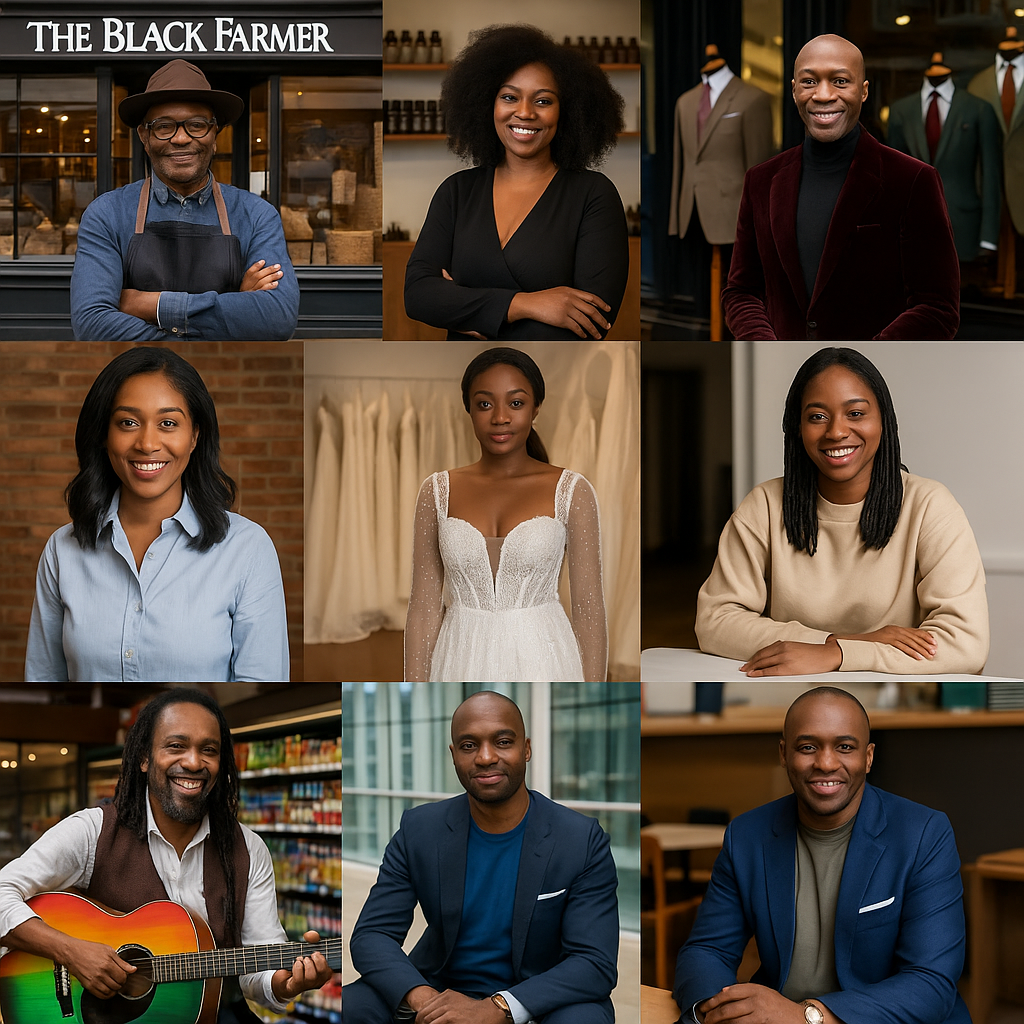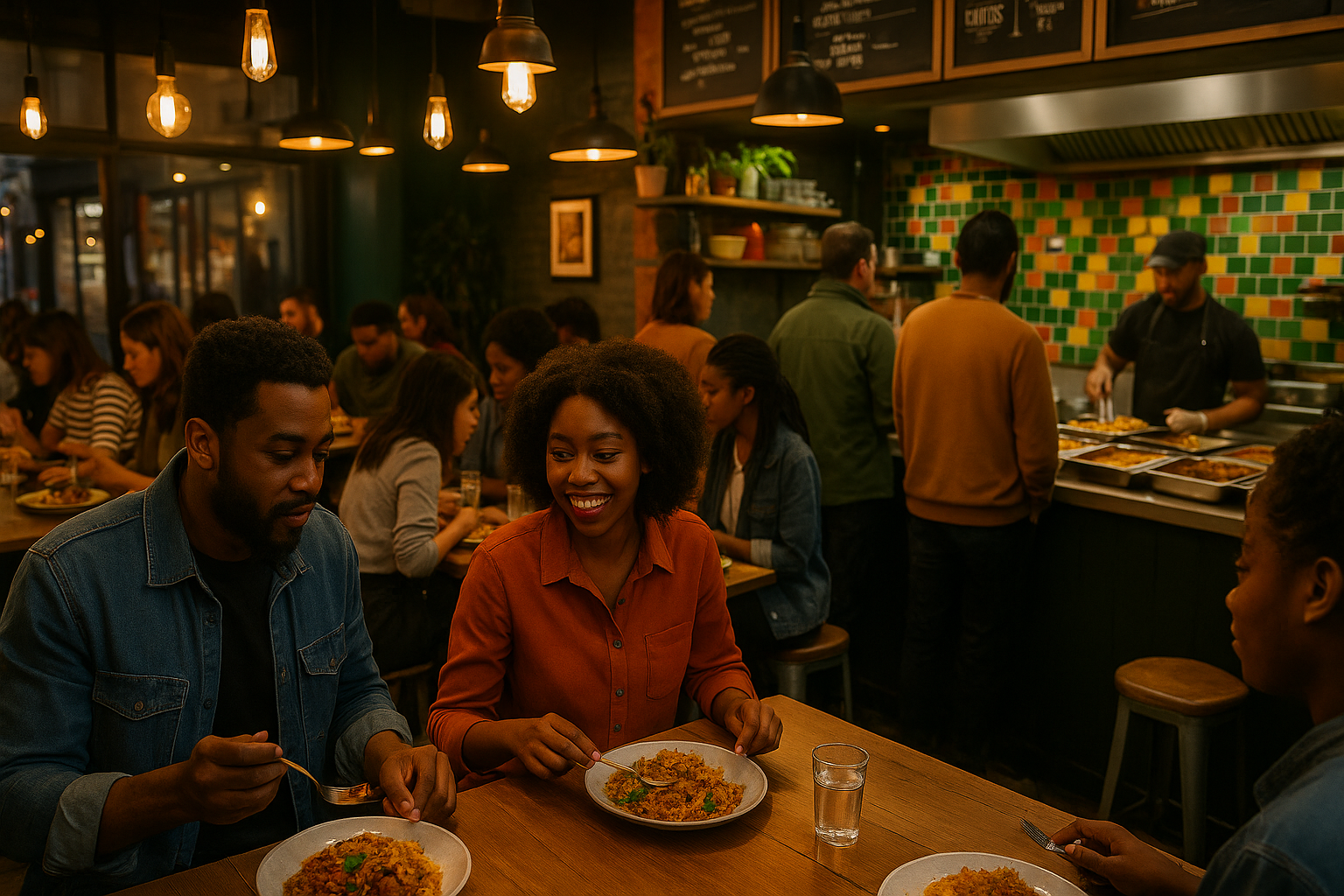10 Black-Owned Businesses in the United Kingdom You Should Know About
Across the United Kingdom a wave of Black entrepreneurship is reshaping industries from farming to fashion to tech. This renaissance is well documented on AfroBiz.uk, the UK’s leading directory showcasing over a thousand Black‑owned businesses spanning London, Birmingham, Manchester, Glasgow and beyond. These businesses are not only thriving but transforming how we think about representation, community wealth, and mentorship. In this blog, we spotlight ten influential Black‑owned enterprises and entrepreneurs across the UK—each built from grit, vision, and a deep sense of responsibility toward giving back. Each story reveals how they started in places like Brixton, Muswell Hill, Swindon, and Nottingham and expanded their reach nationally and even globally. Beyond profits, they teach young people that entrepreneurship is a vehicle for inclusion, creativity, social change—and above all, community empowerment.

The Black Farmer - Cultivating Change in Rural and Urban Britain
Founder Wilfred Emmanuel‑Jones launched The Black Farmer brand on his Devon farm in 2000, but it was only in 2023 that he introduced the flagship urban farm shop in Brixton, followed by White City. Raised in Birmingham after emigrating from Jamaica, he transitioned from a BBC career to farming, breaking stereotypes when advised “is this food for black people?” Emmanuel‑Jones responded by declaring, “black is premium”. His stores offer premium gluten‑free meats and also host workshops empowering small food brands from diverse backgrounds. The struggle to secure funding was steep—he remarks that being a Black farmer “is almost impossible”—but his perseverance has created jobs and visibility for ethnic minority farmers through the Black Farmer Scholarship and Young Black Farmers TV series. His mentorship has inspired many urban youth to tap into hospitality, land management, and food justice.
Hair Lounge - A Legacy of Texture and Transformation
Charlotte Mensah’s Hair Lounge on Portobello Road began in the 1980s and grew into a beacon for Afro‑Caribbean hair care. In 2018 she made history as the first Black woman inducted into the British Hairdressing Hall of Fame. Born in Hampstead and spending childhood summers in Accra, she trained in London and founded the Charlotte Mensah Academy and LOVE initiative in Ghana. She often says “hair became a form of healing”, underscoring how her work addresses identity, self-esteem, and artistry. Through BBC workshops and widespread recognition, she’s helped elevate Afro‑centric haircare as a thriving industry, and personally mentors next‑gen stylists, particularly those from underserved communities, to enter beauty entrepreneurship.
Ozwald Boateng - Tailoring Identity in Savile Row
From a summer job sewing linings at 14 in Muswell Hill to opening the first Black‑owned boutique on Savile Row in 1995, Ozwald Boateng fused Ghanaian color with British tailoring to redefine gentlemen’s suiting. His flagship at No. 30 – the only Black‑owned store on the Row as of 2019 – remains a beacon for traditional craftsmanship with a modern twist. Boateng’s mantra echoes, “If you flow with history and don’t fight with it, eventually it becomes a dance,” reminding young designers to embrace heritage and innovation in harmony. He mentors emerging tailors and collaborates on initiatives like the Made in Africa Foundation, proving that Black presence in luxury is not symbolic—it’s transformative.
Ruka Hair - Redefining Representation in Swindon and Selfridges
Tendai Moyo and Ugo Agbai founded Ruka Hair in 2021 to address the lack of extensions matching type 3c–4c natural textures. Zimbabwean‑born Moyo, who grew up in Swindon, pivoted from banking to entrepreneurship, raising over £1 million via crowdfunding and securing a concession in Selfridges. She explains, “Afro hair textures need to be represented”, and the brand supports training for stylists, while offering biodegradable products. Ruka’s visibility and education initiatives have helped change salon qualification syllabuses and encouraged sustainable standards. Moyo actively shares insights with women in rural towns and inner‑city schools, affirming that beauty care can be socially responsible business.
Shoobs - Turning Urban Music Events into Digital Enterprise
Louise Broni‑Mensah from Edmonton, London, founded Shoobs in 2010 to solve ticketing hurdles in Black cultural events. After graduating in mathematical economics and working as a junior trader, she launched Shoobs from her kitchen table, later winning Shell LiveWIRE and joining Y Combinator. As the first Black female UK founder to gain Silicon Valley investment, she asserts “often when you are doing something really groundbreaking you’ve got to be ahead of the curve”. Shoobs now supports hundreds of urban music events across the UK and plans expansion into African markets. Broni‑Mensah mentors young tech founders, especially women of color, showing how tech can amplify culture and economic opportunity.
Alonuko - Bridal Couture Celebrating Melanin Worldwide
Gbemi Okunlola launched Alonuko in London in 2012 to serve brides of colour seeking couture tailored to deep skin tones and curves. Initial struggles included entering traditional bridal markets that overlooked Black clients. Nonetheless, trunk shows in Texas and New York proved demand was global. “It was a three‑week event and we saw 100 brides,” she recalled to The Times, affirming the niche’s power . Alonuko now mentors aspiring bridal designers, offering behind‑the‑scenes access to design, marketing, and cultural styling. The brand’s success inspires entrepreneurial targeting of under‑served communities with both luxury and inclusivity.
Bejay Mulenga - Empowering Youth through Social Enterprise
In Nottingham‑born Bejay Mulenga launched Supa Network after winning the Queen’s Award for Enterprise Promotion at age 20. He founded The Great Feast of London during lockdown to tackle food poverty and became known for “A Plate for London” meals delivery program . Mulenga champions, “Creating role models is my mission” , and runs workshops in schools, offering digital skills, leadership training, and social entrepreneurship mentorship. By connecting disadvantaged youth with corporate partners, Bejay shows how enterprise can directly address inequality and inspire civic-minded business models.
Levi Roots - Cooking Culture into a Billion Dollar Brand
Legendary Reggae Reggae Sauce founder Levi Roots began selling at market stalls in Brixton before pitching on Dragon’s Den in 2007. His pitch earned mentorship rather than investment and led to major supermarket launches. Emphasizing Caribbean heritage, his brand turned humble jerk seasoning into a household staple. Levi says, “I put my culture on the shelf” , underscoring how authenticity sells. He now mentors food entrepreneurs through workshops and memoirs, showing how embracing identity can fuel mainstream business.
Piers Linney - Investing in Inclusive Finance from Lancashire to London
Lancashire‑born Piers Linney rose from a mill town to national prominence as a Dragons’ Den investor. A tech entrepreneur and diversity advocate, Linney has championed Black and minority businesses via consultancy and investment work. He notes that inclusive corporate strategies benefit from “visionary entrepreneurship” and argues that representation “influences corporate strategies toward more equitable practices”. Piers actively mentors fintech and AI startups led by ethnically diverse founders, emphasizing that inclusion must begin with capital access. London’s startup scene has benefitted from his board roles and speaking engagements, with direct mentoring programs inspired by his journey.
Yvonne Thompson - Pioneering PR and Cultural Leadership
Guyana‑born Yvonne Thompson established ASAP Communications in Croydon in 1983 and later co‑founded Choice FM. The first Black woman to run a PR firm and chair The Radio Academy, her career spans decades of advocacy in media and business representation. She emphasizes that “a level playing field so that our young women with potential…can be confident citizens”. Thompson mentors female founders via the European Federation of Black Women Business Owners, using her influence to shift policy and corporate inclusion. Her trailblazing shows how media and communications can elevate Black entrepreneurship on a national stage.
Meta‑Impact across Communities and Cohesion
Each of these ten entrepreneurs has built more than a business—they’ve built ecosystems. From Brixton’s farm shop breaking agricultural norms to Savile Row tailoring challenging luxury traditions, from tech platforms amplifying culture to social ventures tackling poverty, all have taken struggles—funding barriers, cultural bias, resource gaps—and turned them into catalysts for mentorship and visibility. They have launched training programs in hair, food, bridal, tech and finance, contributing knowledge and inspiration to the next generation. Media coverage—from The Times to BBC, from The Guardian to Dragon’s Den—has validated their impact while serving as a spotlight for aspiring entrepreneurs. More than isolated success stories, they represent a coordinated shift in the UK business landscape—heritage plus innovation plus mentorship equals sustainable change.
Building a Stronger Britain Through Black Entrepreneurship
The story of Black‑owned businesses in the United Kingdom is one of momentum, innovation, and collective aspiration. From London to Leeds, Birmingham to Glasgow, these enterprises are weaving economic strength, social capital, and cultural pride into their communities. Leaders such as Yvonne Field and Kanya King, along with platforms like AfroBiz.uk and the Black British Business Awards, are not just documenting this success—they’re architecting a more inclusive economy. Mainstream media recognition signals broader acknowledgment of the value these enterprises bring. Yet to sustain and accelerate this growth, cross‑community support is essential. When every consumer, client, institution, and policymaker chooses to support local Black businesses, the multiplier effect improves livelihoods, fosters diversity, and builds a stronger, more equitable Britain. This isn’t aspirational—it’s already happening. And together, we can help it thrive.
These ten Black‑owned businesses across the UK—from Devon to Nottingham, Swindon to Savile Row—illustrate how culture, tenacity and community purpose can transform industries and inspire future leaders. Each story, listed on AfroBiz.uk, proves that entrepreneurship tied to identity and social impact isn’t just powerful—it’s profitable, visible, and necessary. They’ve taught us that representation matters in retail aisles, boardrooms, red carpets, and social media feeds. Mentorship, whether through workshops, scholarships, trunk shows, or digital inclusion, amplifies their influence far beyond turnover numbers. Our economic future grows richer when we champion all entrepreneurs, and Black‑owned businesses—once relegated to niche—are now forging new mainstream pathways. Let these ten be inspiration, invitation, and roadmap for others. Explore them, support them, and together we can build a stronger, more inclusive UK economy via AfroBiz.uk and beyond.


